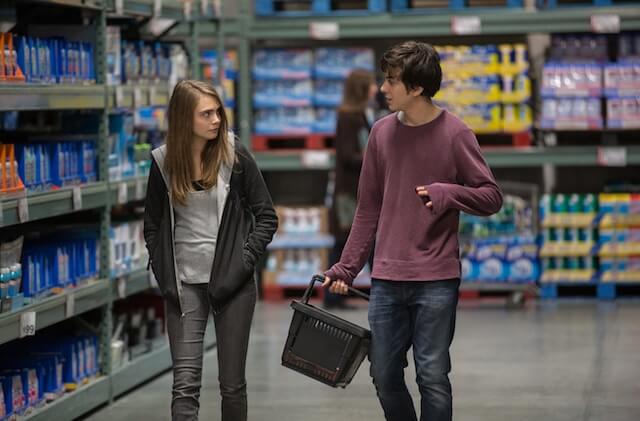‘Paper Towns’ Recently “Me and Earl and the Dying Girl” went out of its way to say it’s definitely not the kind of movie it definitely is: where the almost certainly more interesting characters, at least one of them female (and maybe dying), exist purely to help a comparatively uninteresting young, pretty much always white male through his comparatively uninteresting problems. “Paper Towns” is also definitely that movie, but, a more complicated ending than required aside, it doesn’t pretend it’s not. Perhaps this is unfair, but the lack of pretense makes it far less odious than “M&E&tDG” — that, and that it features a black friend who has more than one dimension and a life of his own and everything. The source is the smarty-pants, nerd-cool (which, at this point, is cool-cool) literature of John Green, albeit not one as out-there as “The Fault in Our Stars,” whose hero was not only a she but a she with cancer. Q, the protag of “Paper Towns,” is bland relative to anyone, especially the gonzo supporting roles played by star Nat Wolff in “Palo Alto,” as well as “Stars.” A shy late bloomer, he’s only coaxed out of his shell in the waning days of his senior year, namely when free-spirit-across-the-street Margo (Cara Delevingne) appears in his bedroom window, demanding his services as a getaway driver on a series of quirky revenges. After this teenage “Something Wild,” Q is smitten — right in time for Margo to disappear, as she often has. But she leaves clues to her whereabouts both arcane and sometimes super hip, especially to, say, a 37-year-old writer of YA fiction. (Unless the kids these days are definitely into Billy Bragg on vinyl?) RELATED: Cara Delevingne admits she can’t drive As far as models-turned-thespians go, Delevingne ranks somewhere between Elle MacPherson and Emily Ratajkowski. She has a husky voice and an effortless air of the cool, older girl, in part because she’s five year’s older than the guy in love with her. She’s perhaps not the kind of presence whose absence leaves a gaping hole, but in the end her slight vacuity retroactively works in the movie’s favor. This is a film (and novel, presumably) about someone projecting a mythology upon another — about professing love without having any idea what one’s object of affection is truly like. That’s a radical notion for a teen movie, or any movie, to have, and it follows what’s a fairly zany riff on the Girl of My Dreams and road trip movies. Of course, sometimes “zany” simply means “quirky,” as Green gives one of Q’s friends (Justice Smith) parents who are angling to score the Guinness slot for “most Black Santas.” Margo, meanwhile, likes to randomly capitalize her words, because holy crap that’s quirky Despite the good things “Paper Towns” does (teaching boys to not objectify women) and the less good (an epic urination gag), it’s still a movie revolving around the minor growth of a semi-interesting dude. And it doesn’t stop there: women tell Q that he’s “cute when he’s confident,” and even in one case throw themselves at him, but only after gifting him with a kiss. It’s a fantasy, but it’s a fantasy for quietly eccentric youngsters that offers them at least some of the right messages — messages Q spends what feels like 10 years of the climax unspooling on the narration track over against music too bombastic and feels-heavy to even be M83. Kids these days — or 30-somethings’ ideas of kids these days, peddled back to them.
Director: Jake Schreier
Stars: Nat Wolff, Cara Delevingne
Rating: PG-13
3 (out of 5) Globes
‘Paper Towns’ offers the kids good — and not good —messages

Twentieth Century Fox
Follow Matt Prigge on Twitter @mattprigge















